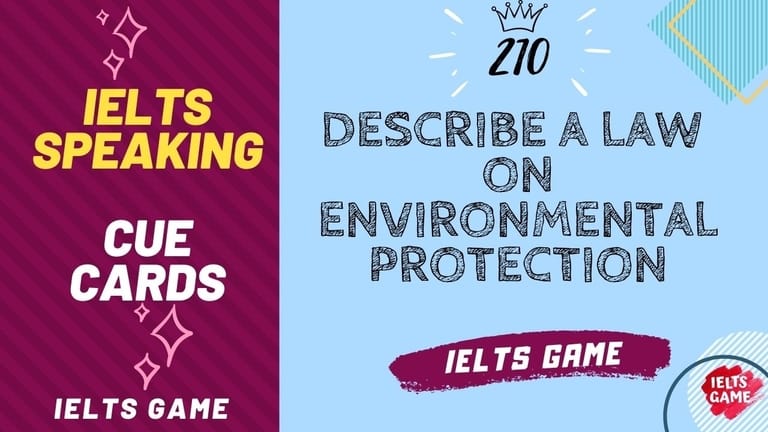210. IELTS Cue Card -
Describe a law on environmental protection
In this article, IELTS Game will add number 210 IELTS cue card sample on the series of 2023 cue cards with band 9.0 model answers and part 3 follow up questions that will help you in your IELTS test preparation.
This cue card is related to “Low description” speaking topic and asking you to “Describe a law on environmental protection“ and asking IELTS speaking part 3 follow up questions.
IELTS Cue Card Sample 210
Describe a law on environmental protection.
You should say:
- – What it is?
- – How you first learned about it?
- – Who benefits from it?
- – And explain how you feel about this law?
Band 9.0 Sample Answer Ideas.
One law on environmental protection that I am familiar with is the Clean Air Act, which was enacted by the United States federal government in 1970. I first learned about this law in high school while taking an environmental science class.
The Clean Air Act sets national air quality standards and regulates the emission of air pollutants from stationary and mobile sources. It applies to both public and private sectors, and its main goal is to protect human health and the environment from the negative impacts of air pollution.
The main beneficiaries of this law are the general public, who benefit from improved air quality and the associated health benefits. However, businesses and industries that emit large amounts of air pollutants may be required to make costly changes to their operations in order to comply with the law, which can be a burden for them.
Overall, I feel that the Clean Air Act is a necessary and important law that helps to protect our health and the environment. While it may be inconvenient for some businesses, the long-term benefits of clean air far outweigh any short-term costs.
Related Vocabularies and meaning.
| Word | Meaning |
|---|---|
| enacted | passed into law |
| emission | the action of releasing something (such as a gas) into the environment |
| air pollutants | substances that are harmful when present in the air |
| stationary | not moving or capable of moving |
| mobile | able to move or be moved easily |
| public sector | the part of a country’s economic system that is controlled by the government and includes services such as education and healthcare |
| private sector | the part of a country’s economic system that is controlled by private companies and individuals, rather than the government |
| burden | something that is difficult to bear or overcome |
Another Band 9.0 Sample Answer Ideas.
Here are another band 9 answer to describe a law on environmental protection IELTS cue card.
I’d like to describe a law on environmental protection called the Water Framework Directive. This is a European Union law that was enacted in 2000 to protect the quality of all water bodies in the EU, including rivers, lakes, wetlands, and groundwater. I first learned about this law while studying environmental policy in college.
The Water Framework Directive sets out a framework for the protection, improvement, and management of all water bodies in the EU. It establishes environmental standards for water quality, and requires member states to take measures to protect and restore water bodies to a good ecological status. The main beneficiaries of this law are the water bodies and the ecosystems that they support, as well as the people and industries that depend on clean water.
I believe that the Water Framework Directive is an important law that helps to ensure that we have clean and healthy water resources for the benefit of all. Water is a vital resource that is essential for life, and it is crucial that we take steps to protect it. I think that laws like the Water Framework Directive are necessary to safeguard our environment and ensure a healthy future for all.
Related Vocabularies and meaning.
| Word | Meaning |
|---|---|
| enacted | passed into law |
| framework | a set of rules, principles, or ideas that provide a structure for something |
| environmental standards | levels of quality or performance that are required by law or agreed upon for the protection of the environment |
| member states | countries that are part of a larger organization or group |
| beneficiaries | people or groups that benefit from something |
| safeguard | protect or secure |
| vital | essential or necessary for life or well-being |
IELTS Speaking part 3 Follow Up Questions.
Here are some follow up questions you may be asked during part 3 IELTS Speaking exam by the IELTS examiner related to 1st cue card:
“Describe a law on environmental protection”
1. Do you think this law is acceptable to the people?
Yes, I think this law has been accepted well by the people of India. There is growing awareness about the environmental issues and Indians too are making their efforts to save and preserve the environment.
2. Is there any situation wherein people may disobey the law?
Yes, there are situations when people disobey the/this law. The main reasons for such laws not being followed by the people are personal profits/benefits and the convenience that they may have to give up.
3. Do people like being a police officer in your country?
Yes, many people in my country like being a police officer. Every year there are several people who take the tests to become a police officer.
The competition that exists for such exams is a clear indicator that many people strive to become police officers and serve their country.
4. What qualities should a police officer possess?
A police officer should possess many qualities. He/she should be physically fit and active and should have a passion to serve the people and the Nation.
Some other qualities are honesty, eagerness to search for the truth and bring justice to people, some skills like martial arts or other such combat skills to fight the criminals, courage, fearlessness, determination, and many more such qualities.
5. Why some people prefer to be a lawyer?
Some people prefer to be a lawyer because they want to ensure that everyone receives justice and is treated fairly by the law.
They may have a desire to fight for others’ rights and ensure that everyone gets a fair chance to justify their actions. Some people choose this profession because of the prospects of earning money and fame.
6. Should people be penalized when they use mobile phones while driving?
These days vehicles are well equipped with a system wherein you can connect via bluetooth to your mobile and you can be handsfree and still use your mobile but if a driver is talking or texting on the phone while driving he should be heavily penalized.
7. Is kindness the most important quality of a police officer?
No, kindness is certainly not the best quality of a Police Officer. A Police officer has to be honest, straightforward, and very curious while performing his duty.
Unfortunately, we cannot afford to be very kind as the criminals may take advantage of the situation
8. Do you think both men and women can be police officers?
These days we are living in an egalitarian society so gender bias doesn’t hold ground in any profession.
Every man and every woman is worthy of any profession. So both and men and women are equally capable of serving in the police department
9. Do you think the police officers are paid too much?
I think in the Western world police officers are paid well in accordance to their duties but in the developing countries their salaries do not match the work they do, they deserve better salaries.
But I do not agree that they are paid too much because they face too many dangers of life and limb while performing their services.
10. Do all Indian people obey the law?
Human psychology is the same everywhere in the world when the citizens know that they are going to be caught, penalized, put behind the bars, they will obey the law. A law well implemented is well obeyed.
I think Indian people know they can find loopholes to save themselves, so they do not obey the law. I have come across very honest Indians and very dishonest people from other nations so the system that has to get strict.
11. Are there laws about education in India?
12. What kind of rules do schools in India have?
13. What can teachers do to make students obey rules?
14. What should parents do to educate children about laws?



